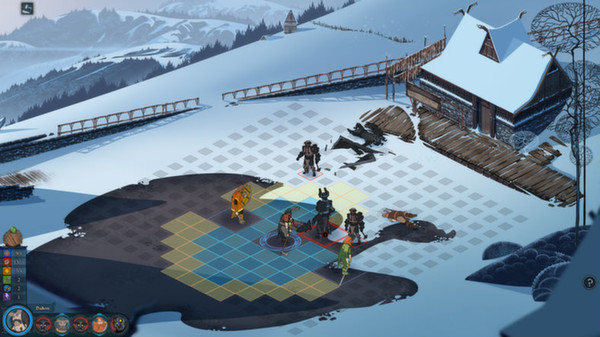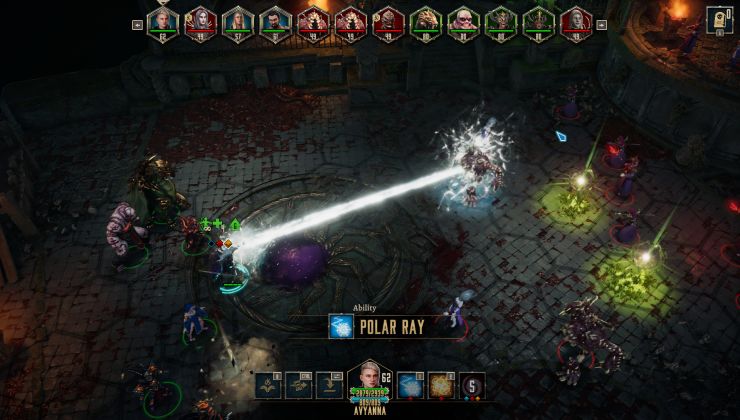We already knew that the second and third parts of The Banner Saga wouldn't be coming to Linux, but now the original The Banner Saga is no longer supported on Linux.

Speaking about it on the Steam forum, one of their moderators said this:
Linux and SteamOS are no longer officially supported. You can probably still play the game with in an outdated/obsolete BETAS branch, but most players have problems ("game won't start").
No plans to update/support Linux at this time, sorry
As it turns out, one of the developers actually posted about it on Reddit last year (the same moderator as quoted above pointed this out in a later post) where they explained it a bit more thoroughly:
The problem is, the external developer that did our linux porting went out of business right after it launched, and before we could fix all its issue, tidy it up, and update its supporting technology. There's no way to get a refund or a financial remedy because, well, they ran out of cash. To extend the linux build to GOG, we'd have to be able to make a new build (Steam builds won't run on GOG), and we don't have the developer or budget available to do that.
Financially speaking, the total amount of income we've made from our Linux port on Steam after 2 years on the market is about 1/4 the cost of porting it.
Why is it so expensive and difficult? Because of the underlying technology we chose as a framework. The game rests on Adobe AIR, which provides platform level abstractions like low level graphics, file IO, networking, etc... At the time we started development, Adobe was strongly supporting Linux. Adobe then abandoned Linux and left both the developers and the players flapping in the breeze. Our linux port takes essentially the same approach as our console ports, removing Adobe AIR completely from the equation.
Hope that sheds some light on it.
It's always a shame when this happens. I know a number of developers who were stung by Adobe AIR dropping Linux support back in 2011. Most of them have moved onto using different tools by now, thankfully.
This is a sad case of multiple issues coming together. Luckily, it's not something that happens all that often.
Quoting: Doc AngeloQuoting: TheSHEEEPWhat safety? If the maintainers of some project decide to drop linux, there's nothing you can do about that, either.
Of course you can.
Situation A: You are using closed source and proprietary software. The dev of this software is stopping support for it or is removing features you depend on. You can't do anything about it, nor would it be allowed.
Situation B: You are using FOSS. The devs of this software are stopping support for it or are removing features you depend on. You are now allowed to take the source code and maintain your own fork of it that doesn't remove what you need.
That a FOSS project removes functionality people are using is already less likely to happen. But even if it happens, you are not without options. That is a really, if not the biggest, argument for FOSS in businesses.
Quoting: TheSHEEEPdo you truly want to place your products in the hand of some hobbyist who might just drop the whole thing again due to lack of interest or free time?
If people wouldn't do exactly that, we wouldn't have gaming on Linux.
I totally agree with Doc Angelo here. If a FOSS software is important enough for enough people there will be people who will fork the thing. I witnessed it myself with my favourite Linux distro "Mandriva" (a commercial Linux distro back in the days).
The company building and maintaining Mandriva went out of business and the community took the ashes of Mandriva and formed the now totally community driven "Mageia" distribution. Mageia could make use of many tools developed for Mandriva and is now completely independent of any other Linux distribution (no Ubuntu derivate e.g.). If the community is big enough, then software maintained by that community will be safer for the end user to use because of it's independence from the whims of the commercial world and it's up and downs.
GIMP is there now, too. You CAN make a living using GIMP, just maybe not as well as Adobe. Not yet.
This is how open source works. First they mock you. Then they dismiss you. Then they hire out small jobs to you. Then world domination.
That said, people we are .5% of Steam. Forget GOG, Steam is the big dog, the one the industry looks at. At the moment it looks REALLY stupid for Valve to have sunk any money in Linux at all. We are not holding up our end of this computing revolution. AMD has put out their ray tracing demo in Vulkan a few months back, was that a mistake? Should they be basing it in DX12 like NVIDIA?
Last edited by jarhead_h on 14 August 2018 at 10:51 pm UTC
Quoting: Purple Library GuyGIMP is a lot better than it used to be to the point that I think it's a viable alternative to Photoshop, assuming you don't rely on some of Photoshop's proprietary features.Quoting: Mountain ManI don't doubt that the GIMP is really good. But at the professional level it seems image fiddling is dominated by various proprietary schemes which the GIMP can't pay to use--or at least, that's how it was for a number of crucial years in the early evolution of Linux. And certain famous features of its UI (which, again, have changed rather these days) were very much of an acquired taste by all accounts. Between those things and a few others, the GIMP was just not as workable a substitute for Photoshop (to a lot of Photoshop users), as OpenOffice was for Office.Quoting: Purple Library Guy...or, hate to say it, the GIMP for Photoshop.I actually prefer the GIMP to Photoshop, although admittedly I am not a graphic design professional. When it comes to post-processing my photos, I find that it produces results just as good as anything I've done with Photoshop. Plus, you can't beat the price, especially when you consider Adobe's onerous subscription model that effectively locks your intellectual property behind a paywall.
Last edited by Mountain Man on 14 August 2018 at 11:30 pm UTC
Quoting: jarhead_hHonestly, people wondering about GIMP v Adobe should look to Blender. 10 years ago it was a punchline to a joke, not even the whole joke. Five years ago it was amateurish, something for hobbyists. Today it's used in small studios for TV work. Where will it be in ten years?
GIMP is there now, too. You CAN make a living using GIMP, just maybe not as well as Adobe. Not yet.
This is how open source works. First they mock you. Then they dismiss you. Then they hire out small jobs to you. Then world domination.
Very much in agreement about this general trajectory. Closed source development tends to happen in rapid bursts which revolve around big releases intended to result in sales. In between such selling events, closed software tends to stagnate. In the runup to such selling events, there is a tendency to concentrate on features which are perceived as likely to drive sales--sexy features, gee-whiz features, in some cases features which enhance lock-in. The window in the process during which creativity can happen is typically narrow. Developer pride inevitably intrudes, and more enlightened companies will emphasize polish to avoid bad buzz, so the results can be good.
Open source development tends to happen fairly steadily, although there still are often quieter periods punctuated with bursts of enthusiasm. They are more open to creativity more of the time. The "scratch an itch" ethos arguably tends to result in a more balanced, practical feature set. And because of this relatively constant development, open projects above a certain size do seem to gradually catch up to and eventually pass their closed cousins--it just isn't profitable for commercial products to do those bursts of activity often enough to keep up in the long run.
QuoteThat said, people we are .5% of Steam. Forget GOG, Steam is the big dog, the one the industry looks at. At the moment it looks REALLY stupid for Valve to have sunk any money in Linux at all. We are not holding up our end of this computing revolution. AMD has put out their ray tracing demo in Vulkan a few months back, was that a mistake? Should they be basing it in DX12 like NVIDIA?Probably not a mistake even if Linux didn't exist. Vulkan runs on Android and older Windows.
I'd certainly love to see Linux with a bigger share on Steam. Any ideas?
Quoting: g000hI've been using The GIMP happily for years. Recently, Krita free open source art software came to Linux (and Windows and MacOS) and is a pretty good Photoshop replacement. Yes, it would be great for Linux if more decent art and design tools came to the platform, and not necessarily from Adobe.
I've heard Inkscape is good at what it does, which is a somewhat different niche.
Don't get me wrong--I would far prefer Linux dominate with a set of open source art/design/graphics applications that blow the doors off their closed competitors and in particular anything Adobe. I don't like Adobe, and I don't like their attitude towards Linux. Even some of their half-hearted gestures in the Linux direction seem to have been less with an eye to do us any good and more just to take the wind out of our open alternatives, to sucker us into relying on crippleware rather than building something solid.
Quoting: Mountain ManAll very true. But it seems as though many users of Photoshopp-ish programs take their cues from the pros, and the pros often do rely on the proprietary stuff. So many people for whom the GIMP would be fine often turn up their nose at it, and in turn on Linux, because the pros do. It's a barrier.Quoting: Purple Library GuyGIMP is a lot better than it used to be to the point that I think it's a viable alternative to Photoshop, assuming you don't rely on some of Photoshop's proprietary features.Quoting: Mountain ManI don't doubt that the GIMP is really good. But at the professional level it seems image fiddling is dominated by various proprietary schemes which the GIMP can't pay to use--or at least, that's how it was for a number of crucial years in the early evolution of Linux. And certain famous features of its UI (which, again, have changed rather these days) were very much of an acquired taste by all accounts. Between those things and a few others, the GIMP was just not as workable a substitute for Photoshop (to a lot of Photoshop users), as OpenOffice was for Office.Quoting: Purple Library Guy...or, hate to say it, the GIMP for Photoshop.I actually prefer the GIMP to Photoshop, although admittedly I am not a graphic design professional. When it comes to post-processing my photos, I find that it produces results just as good as anything I've done with Photoshop. Plus, you can't beat the price, especially when you consider Adobe's onerous subscription model that effectively locks your intellectual property behind a paywall.
Quoting: Purple Library GuyQuoteThat said, people we are .5% of Steam. Forget GOG, Steam is the big dog, the one the industry looks at. At the moment it looks REALLY stupid for Valve to have sunk any money in Linux at all. We are not holding up our end of this computing revolution. AMD has put out their ray tracing demo in Vulkan a few months back, was that a mistake? Should they be basing it in DX12 like NVIDIA?Probably not a mistake even if Linux didn't exist. Vulkan runs on Android and older Windows.
I'd certainly love to see Linux with a bigger share on Steam. Any ideas?
I meant a mistake for AMD to put resources into Vulkan instead of the sure thing of DX12.
Unfortunately all my ideas are all tied to Vulkan and it succeeding. Well, Vulkan and setting up primary school computer labs with Goodwill computers running Cinnamon and the standard host of stuff like GIMP, Libreoffice, Blender, etc. Wouldn't cost much to do at all, and kids would soak it up in nothing flat if made into a game. Don't even need teachers, just have them follow along to Youtube tutorials.
But no, as strange as it sounds, Microsoft rules the world because of Direct3D. That's the actual cornerstone of Redmond's empire. Everyone talks about PCs as though they were always Windows or Mac or linux, and back in the 80's that wasn't even close to being the case. We had Commodore, DOS, Apple and Mac, Tandy, etc. In the 90's Amiga failed and Solaris was never going to be a home computer OS, leaving M$ and Apple. Apple was floundering, but Microsoft was not unbeatable yet. That didn't happen until DirectX completely outclassed OpenGL and 3DFX went under taking Glide down with them. Linux gaming basically meant Tux Racer at this point in time.
Now everything is directX, including the current Xbox, and it forms a feedback loop. Even Playstation games are translated to DirectX for their PC ports(Final Fantasy Remasters for example). This means that console games have almost no chance of making it to Linux with very few exceptions because we don't and never will have DirectX. People aren't just trapped in Windows with their productivity software, they're trapped in their entertainment software which is what has actually driven PC development for all these years. You don't need a GPU to type. You need it to render games. You always hear someone mention Photoshop, but how many people do you know actually make their living with Photoshop? I don't know a single one, but I know a lot of people that want to play Fortnite who don't want to to have to deal with configuring WINE.
This means that Steam is actually Microsoft's greatest potential threat. Valve could kill Microsoft via attrition simply by demanding all new 3D games on Steam have a fully working Vulkan/Opengl rendering option in addition to DirectX. After throwing a giant hissy fit, the industry embrace of it would lead to it's general adoption for Playstation, Apple, Linux, and even Windows, while DirectX12 would be available on Windows and Xbox, and eventually only Microsoft games would use DirectX. From there it's just attrition as more and more people ditch Windows because they don't like being spied on, don't want to pay the Apple tax for hardware they can't upgrade, and instead realize that Mint Cinnamon is actually very a familiar feeling UI that plays the games. Productivity software would follow.
Looks like Valve is going a different way, though, and instead is embracing WINE. Well, it foregoes forcing any devs to shape up, but Valve seems interested in committing the resources to bringing the games to Linux one way or another. Gabe said that they believe the future is open source back when M$ gave us Windows Flat Design/8. Looks like Gabe meant it because over the years Valve has been positioning itself to be OS neutral. Focusing on WINE potentially gets Linux Fortnite AND Photoshop,all in the easy familiar point and click gui-land of Ubuntu.
So, yeah, we're going to have to thank Valve for that world domination thing down the road, because from where I'm standing they've done more than maybe any single dedicated FOSS company to making Linux a viable home computer consumer OS.
Last edited by jarhead_h on 15 August 2018 at 4:50 am UTC
Quoting: Doc AngeloSituation B: You are using FOSS. The devs of this software are stopping support for it or are removing features you depend on. You are now allowed to take the source code and maintain your own fork of it that doesn't remove what you need.I marked the hopelessly optimistic part.
That a FOSS project removes functionality people are using is already less likely to happen. But even if it happens, you are not without options. That is a really, if not the biggest, argument for FOSS in businesses.
That is just what I wrote. Sure you could do that in theory, but most devs, especially small ones, simply do not have the resources to do that.
An option is worthless if it is purely theoretical. For all practical intents and purposes, there is no difference between both situations.
Quoting: Doc AngeloAnd which game that runs on linux actually makes use of free open source engines that are not being maintained by someone who is actually paid?Quoting: TheSHEEEPdo you truly want to place your products in the hand of some hobbyist who might just drop the whole thing again due to lack of interest or free time?
If people wouldn't do exactly that, we wouldn't have gaming on Linux.
Compare that to the amount of games made on engines by people who maintain said engine for a living.
It's just not a wise business decision to place your own products in the hands of pure hobbyists.
You also cannot compare that situation to software like Ubuntu, which is open source, but its developers (at least partly) do earn money with the ecosystem around Ubuntu.
Godot is similar in that the main devs do earn their living with the engine.
I consider both Ubuntu and Godot very safe to use, as they combine the open source benefits with the stability of people actually being paid.
But placing your software in the hands of projects that do not have a monetary backup means letting lady luck decide, and that is risky at best.
And what the devs of Banner Saga did was just ill-informed, as Adobe announced dropping linux support very early, yet they choose to use AIR for a cross-platform effort.
Last edited by TheSHEEEP on 15 August 2018 at 9:18 am UTC









See more from me